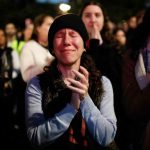I’ve argued before that, if universities ban “advocacy of genocide,” that “could easily be used against pro-Israel speakers,” such as those who support Israel’s counterattack on Hamas in Gaza. Here’s supporting evidence, from the Harvard/Harris poll conducted last week:
It appears that a substantial majority of college-age registered voters, and indeed likely of 18-to-34-year-olds, characterize Israel’s actions in Gaza as “genocide.” And though the majority among the public at large don’t do that, it’s easy to imagine many university administrations and faculties who would be more on the anti-Israel side than is the country as a whole—especially when they are supported in their anti-Israel positions by student sentiment. (I strongly disagree with this condemnation of Israel’s actions, but we should recognize the sentiments as they actually appear to be, not as we wish they were.)
Plus of course in fifteen years, today’s 18-to-34-year-olds will in ten years be the 33-to-49-year-olds, and the many of the strong supporters of Israel’s actions will be dead of old age; perhaps people’s views will change as they get older, but that’s far from clear. Worth considering, I think, before one demands a First Amendment exception for “advocacy of genocide,” or an exception from free speech principles that many private universities have at least ostensibly adopted.
The post If Colleges Ban “Advocacy of Genocide,” What Would That Mean for Speech Supporting Israeli Actions in Gaza? appeared first on Reason.com.






